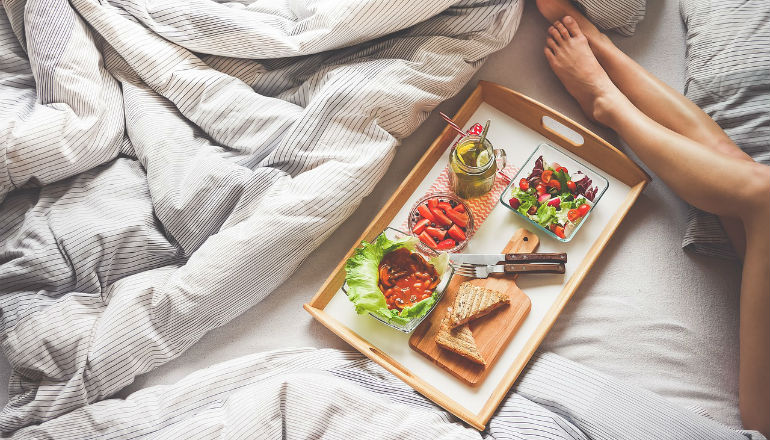
There are so many aspects to eating for weight loss. What to eat is one aspect. How the body processes your food is also incredibly important. But when you eat is an often overlooked and critical component of successfully losing weight.
I wrote recently about how your body processes calories based on your metabolism and how dieting and long-term calorie restriction can destroy your metabolism — making it nearly impossible to lose fat. This puts many people (women, in particular) in a destructive downward spiral of eating less and doing more in an effort to shed those stubborn pounds. If you want to be toned and lean, then it is essential you eat sufficient calories to ensure your body is in burning mode and not storing mode.

Of course, you can’t just eat anything. It truly matters what you eat and in what combination. Everything we eat creates a hormonal/chemical effect in our body. For instance, the way our body responds to carbohydrates can be altered with the addition of proteins and fats. Eating in this combination dramatically decreases insulin output, which then decreases your body’s message to store fat.
That’s a brief rundown of what to eat and how the body deals with what we eat. Now, let’s talk about when to eat for successful weight loss. Because timing is everything.
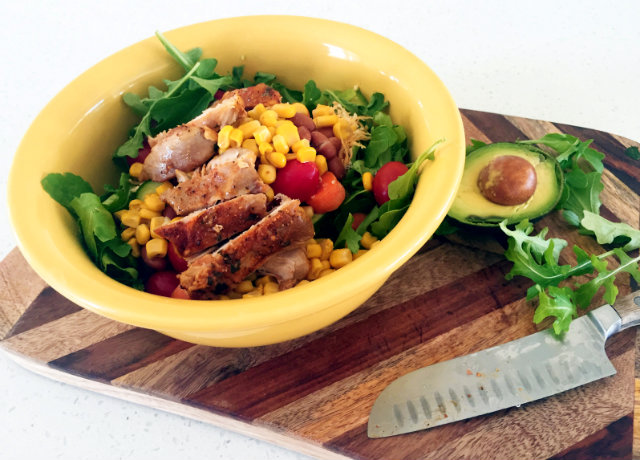
This Mexican chicken salad is a filling and nutritious meal that I often eat.
1. Eat Regularly
One of the keys to losing weight and keeping it off is to consistently feed your body. I am a firm believer that if your body knows it is always getting the calories it needs, it will utilize the fuel you feed it for energy rather than storing it. If the body is guessing when it is going to be fed next, it is more likely to store. So, don’t keep your body guessing. Consistency is what a healthy body needs.
I recommend eating every three hours, even if it is just a snack. Skipping meals or not eating enough of the right types of foods keeps your stress hormones, such as insulin and cortisol, elevated because your body thinks it is experiencing a famine. Instead of utilizing the calories consumed, your body will store them as fat.
Eating regularly increases your metabolic rate. This means your body burns more calories at rest because it is processing all its biological functions at the optimal level. Think of your body like a furnace. The more fuel you feed it (assuming it is the right type of fuel), the more fuel it will burn and the more powerful the output will be.
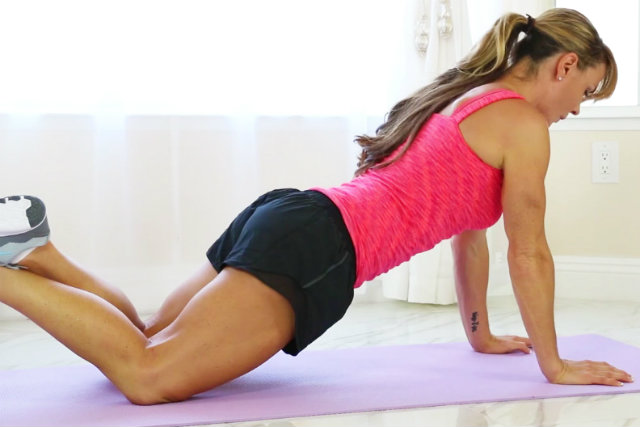
I fuel my workouts and my muscles by eating consistently.
2. Eat Within an Hour of Waking Up
Your first meal sets the benchmark for the rate at which your body will burn your fuel for the day. This is why you may have heard that breakfast is the most important meal of the day. It really is. I can say from personal experience, that out of all my clients, the ones who don’t eat breakfast find it the hardest to lose weight.
I recommend eating within an hour of waking in the mornings. Eat something even if it is small. Doing so will kick start your metabolism and let your body it will be getting the calories it needs for the day to operate at its best.
If you have been awake for a few hours and have not yet eaten, you are essentially telling your body that it is not going to get fed. That means the next time you do eat, your body (which is now in a stressed state) will be looking to store your food instead of burn it.
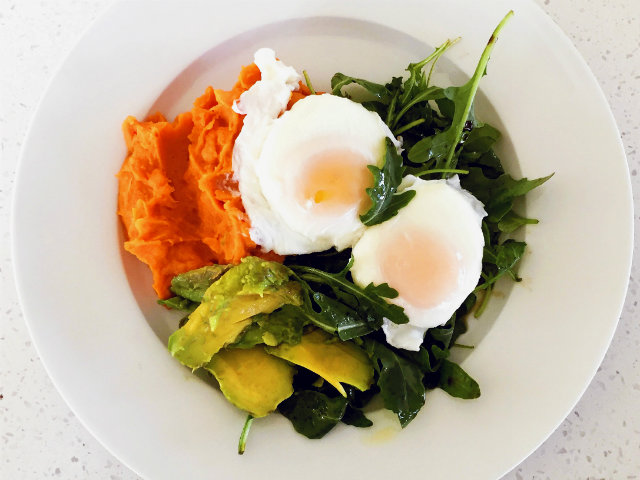
This simple meal is one of my favorites — click here to learn how to make it.
3. Stop Eating When You Are Full
One of the easiest ways to gain weight is to overeat in a single meal. If your body cannot utilize the calories at that time, it will store them.
- Excess protein is excreted as urea and also converted to sugar and/or stored as body fat by a complicated (and not preferable) process.
- Carbohydrates are stored in your muscles and liver as glycogen, and then as fat.
- Excess fats that you eat are broken down and restructured to be stored as fat.
To ensure the meal you eat is more likely to be utilized for energy as opposed to fat storage, to eat smaller portions. If you are at a restaurant, stop eating when you are feeling full and get a to-go box for the rest.
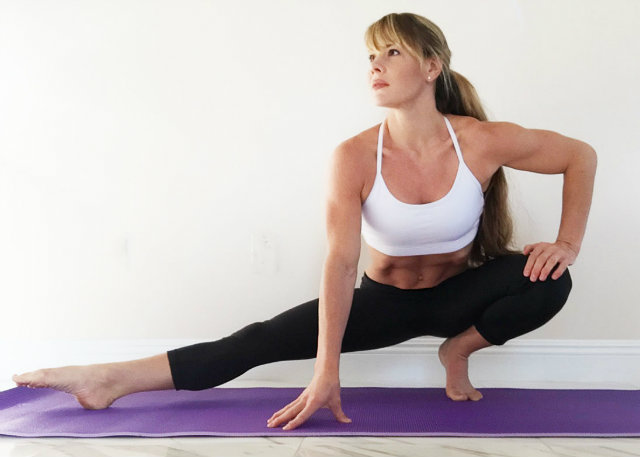
Paying attention to both nutrition and exercise is what keeps me fit.
4. Eat Your Carbs Around Your Workouts
Carbs are by far your body’s preferred energy source. The body very readily converts carbohydrates to ATP to be used for energy. The flip-side of this is that unused carbs can also be readily stored.
I recommend eating slow-releasing complex carbs in the morning when you have the day to burn them off and then arranging the rest of your cabs around your exercise. Eat complex carbs such as oatmeal or sweet potato about an hour or so before your workout to give you an energy boost. Then, eat a small amount of carbs, say a piece of fruit, soon after the workout when your glycogen stores (the energy in your muscles) are depleted and need to be refueled.
I do not recommend sitting down to a big bowl of pasta late at night when your body doesn’t have an opportunity to utilize these calories. This will most likely end up being stored and go straight to your hips and thighs.
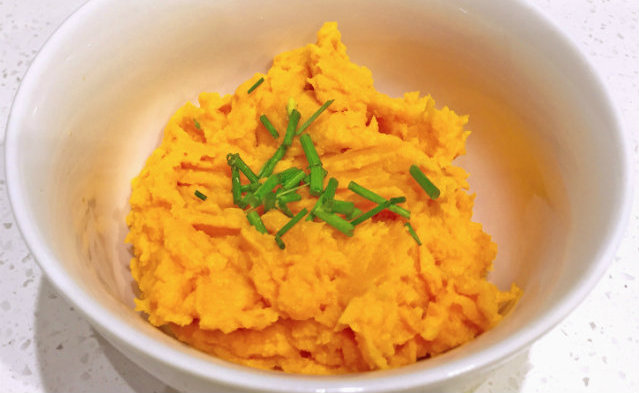
My sweet potato bacon mash is one of my favorite ways to get healthy carbs.
The Basics of When to Eat to Lose Weight
As you can see, when to eat is just as important as what you eat. In summary to eat for weight loss or to maintain a lean body:
- Eating regularly is important to ensure your body utilizes the calories you consume as well as maintain an elevated metabolism.
- Eating smaller meals more often ensures your body will utilize the calories rather than store surplus calories consumed all at one big sitting.
- Breakfast is the most important meal of the day. Try to eat within an hour of waking to signal to your body that it will get the fuel it needs to function optimally for the day.
- Finally, try to eat your carbs early in the day and centered around your workouts.
Focusing on these simple elements of when to eat for weight loss should bring your closer to your goals and help you establish lifelong habits for healthy eating.






























 FITNESS MOTIVATION
FITNESS MOTIVATION




